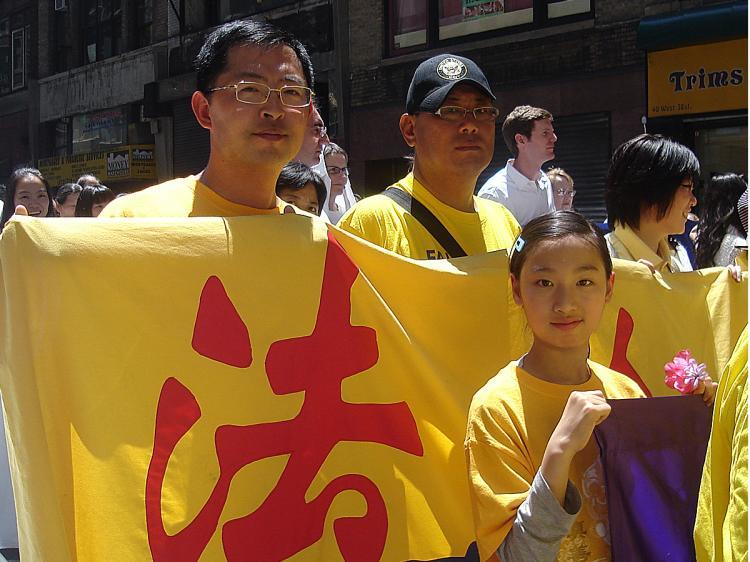Tiananmen Square, the austere heart of Beijing, offers visitors the world over a glimpse into the red veil of China’s regime. For native Chinese man Ma Kit, it symbolizes sorrow and separation.
A decade after the Tiananmen Massacre, Ma strode to the square in righteous defiance—sure of his ability to make a difference. He shouted the unspeakable, “Falun Dafa Hao.”
It means “Falun Dafa is good,” and the police knew those words well. It was their call to action. An order from the regime’s head, Jiang Zemin, in 1999 to “eradicate” the practice had been seared into their training.
“Two police officers twisted my arm toward my back and forcefully yanked it upward, then pushed my head downward,” Ma said. “Several police officers dragged me to the corner, while another kicked me violently.”
Ma started practicing Falun Gong, an ancient Chinese cultivation practice based on the principles of truth, compassion, and forbearance, in 1996. He quit smoking and drinking and felt a sense of inner peace he had not experienced before. His wife started practicing in 2004.
Born in the mainland, but a Hong Kong resident, Ma lived in Beijing with his wife and daughter, working at his private company selling medical equipment. His wife and daughter were residents of mainland China. Each needed a visa to travel to the others’ home of residence.
Ma was without his passport the day he went to Tiananmen to appeal. Taken to the police station, he saw it was filled with Falun Gong practitioners from all over the country. All had come to appeal, including children, pregnant women, and the elderly.
The police took Ma home to get his passport.
“At that time, my daughter was not even a year old,” Ma said. “Seeing a group of ferocious policemen, she was so scared that she cried. My heart was broken.”
He was interrogated all night, accused of violating China’s laws, and deported to Hong Kong the next day. Within 24 hours he had crossed the border and was back in the mainland, determined to be with his family.
Hearing the state-run media vilify Falun Gong for months, and seeing many of his friends arrested and persecuted, Ma knew he had to appeal for justice.
On Oct. 1, 2000, he went to Tiananmen Square again, this time armed with a banner that read “Falun Dafa Hao.” He was arrested within two minutes of brandishing it.
That night he was detained in the Beijing Xicheng District Detention Center, where the police made him and other Falun Gong practitioners strip and stand in one place. They confiscated his home return permit (an identification card for Hong Kong citizens to enter mainland China) and deported him again.
Back in Hong Kong and separated from his family, Ma applied for a replacement permit, but was told he was barred from entering mainland China for five years. He was officially blacklisted. His business had to shut down and the company accrued a debt of more than 300,000 yuan (about US$44,000).
His wife, meanwhile, was struggling to look after their child amid constant harassment and threats by police and her supervisor at work. Her home and her cell phones were monitored. Afraid of causing trouble for others, she did not contact her parents, relatives, or friends.
Her mental health suffered and Ma said his wife contemplated suicide several times. She eventually quit her job.
His daughter, Ma Jia Yi, always asked her mother, “When will daddy come back? I want daddy.”
The child became introverted and timid. She stopped interacting with other children and had nightmares.
“I missed my wife, missed my daughter, and missed my elderly mother,” Ma said. “How I wished that I could be with my wife, have a normal person’s life, and enjoy the happiness of normal people’s family.”
His family applied for Hong Kong residency three times after 2003. They met all the requirements, but their applications were denied each time.
Enduring the five years apart, Ma re-entered mainland China in 2006. A new job at the end of 2007 lasted two days—the supervisor was notified that he was on the 610 Office’s blacklist and fired him. The 610 police force was set up in 1999 with the express purpose of persecuting Falun Gong.
Undeterred, Ma bought another company. Six months later, police broke the door and raided his office. It was time to get out.
Ma’s wife obtained a visa to the United States in May 2008 and left China. Ma followed in January 2009 once their daughter was granted a visa.
Together and finding a semblance of freedom in Flushing, New York, the family is rebuilding, still anxious when they hear sirens or footsteps of people approaching their house.
Ma practices Falun Gong ever more diligently, he says. He also helps other mainland Chinese to understand the persecution and renounce their membership from the Communist Party.
A decade after the Tiananmen Massacre, Ma strode to the square in righteous defiance—sure of his ability to make a difference. He shouted the unspeakable, “Falun Dafa Hao.”
It means “Falun Dafa is good,” and the police knew those words well. It was their call to action. An order from the regime’s head, Jiang Zemin, in 1999 to “eradicate” the practice had been seared into their training.
“Two police officers twisted my arm toward my back and forcefully yanked it upward, then pushed my head downward,” Ma said. “Several police officers dragged me to the corner, while another kicked me violently.”
Ma started practicing Falun Gong, an ancient Chinese cultivation practice based on the principles of truth, compassion, and forbearance, in 1996. He quit smoking and drinking and felt a sense of inner peace he had not experienced before. His wife started practicing in 2004.
Born in the mainland, but a Hong Kong resident, Ma lived in Beijing with his wife and daughter, working at his private company selling medical equipment. His wife and daughter were residents of mainland China. Each needed a visa to travel to the others’ home of residence.
Ma was without his passport the day he went to Tiananmen to appeal. Taken to the police station, he saw it was filled with Falun Gong practitioners from all over the country. All had come to appeal, including children, pregnant women, and the elderly.
The police took Ma home to get his passport.
“At that time, my daughter was not even a year old,” Ma said. “Seeing a group of ferocious policemen, she was so scared that she cried. My heart was broken.”
He was interrogated all night, accused of violating China’s laws, and deported to Hong Kong the next day. Within 24 hours he had crossed the border and was back in the mainland, determined to be with his family.
Hearing the state-run media vilify Falun Gong for months, and seeing many of his friends arrested and persecuted, Ma knew he had to appeal for justice.
On Oct. 1, 2000, he went to Tiananmen Square again, this time armed with a banner that read “Falun Dafa Hao.” He was arrested within two minutes of brandishing it.
That night he was detained in the Beijing Xicheng District Detention Center, where the police made him and other Falun Gong practitioners strip and stand in one place. They confiscated his home return permit (an identification card for Hong Kong citizens to enter mainland China) and deported him again.
Back in Hong Kong and separated from his family, Ma applied for a replacement permit, but was told he was barred from entering mainland China for five years. He was officially blacklisted. His business had to shut down and the company accrued a debt of more than 300,000 yuan (about US$44,000).
His wife, meanwhile, was struggling to look after their child amid constant harassment and threats by police and her supervisor at work. Her home and her cell phones were monitored. Afraid of causing trouble for others, she did not contact her parents, relatives, or friends.
Her mental health suffered and Ma said his wife contemplated suicide several times. She eventually quit her job.
His daughter, Ma Jia Yi, always asked her mother, “When will daddy come back? I want daddy.”
The child became introverted and timid. She stopped interacting with other children and had nightmares.
“I missed my wife, missed my daughter, and missed my elderly mother,” Ma said. “How I wished that I could be with my wife, have a normal person’s life, and enjoy the happiness of normal people’s family.”
His family applied for Hong Kong residency three times after 2003. They met all the requirements, but their applications were denied each time.
Enduring the five years apart, Ma re-entered mainland China in 2006. A new job at the end of 2007 lasted two days—the supervisor was notified that he was on the 610 Office’s blacklist and fired him. The 610 police force was set up in 1999 with the express purpose of persecuting Falun Gong.
Undeterred, Ma bought another company. Six months later, police broke the door and raided his office. It was time to get out.
Ma’s wife obtained a visa to the United States in May 2008 and left China. Ma followed in January 2009 once their daughter was granted a visa.
Together and finding a semblance of freedom in Flushing, New York, the family is rebuilding, still anxious when they hear sirens or footsteps of people approaching their house.
Ma practices Falun Gong ever more diligently, he says. He also helps other mainland Chinese to understand the persecution and renounce their membership from the Communist Party.



